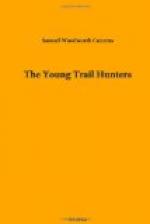“Why, I think they are a cruel, cowardly, treacherous tribe, as Mr. Mastin said; and the dirtiest things I ever saw.”
“Tell me, Jerry, do you know much about them?” interrupted I. “If you do, tell us something of their character and habits, as you’ve seen them.”
“Wall, I’ve been through their country seven times, and I’ve met a heap of ’em, one way and another; but I hain’t got no better opinion of ’em than Mr. Mastin hed. They’re the smartest, wickedest and cunningest, Injins I ever seed. A Comanche ain’t a touch to ’em, and I’ve never yet seed a white man smart enuff to beat ’em.”
“You don’t exactly mean that, do you, Jerry?” inquired I.
“That’s exactly what I do mean: no more and no less,” was the reply. “You’ll hev a chance ter see for yourself, afore we git through this trip, I’m thinkin, or you’ll be the only man thet ever travelled through their country that hain’t; that’s my idee, sartin. Why, the cusses’ll telegraph to one another all over the country, and know just what’s goin’ on a hundred miles away.
“Americans can’t understand ’em, and never will. No one ever saw a white man look at a country as a ’Pache does: he’ll see everything. Ther ain’t a ravine, gully, rock, bush, or tree, a foot high, thet he don’t hev his eye on. Now, a white man don’t look at a country in that way, does he?
[Illustration: Apache Trailing.]
“Jest ez likely ez not, there’s a Injin within a dozen yards of us; but we wouldn’t think it.”
“A dozen yards of us!” exclaimed Hal, looking around; “why, where could he hide, I’d like to know?”
“That’s jest it, youngster. We might go within ten feet of him, and never see him. Why, I’ve knowed ’em to hide behind a brown-bush, clump er cactus, or a rock, so mighty cunnin’ thet ther ain’t one scout in fifty would see ’em, let alone a stranger.
“They’ll kiver therselves with grass, and lay on the ground all day, without movin’, waitin’ for a party to pass. I’ve been within ten foot of one myself, and seed him, too, and thought ’twas a part of the rock he was lying agin.
“I tell yer, them fellers’s smarter’n a whip! They be, sartin, now.”
“Well,” said Ned, who had been listening attentively to Jerry’s description of the Apache character, “if I’d had any idea these Indians were half as smart as you say they are, I’d rather have stayed in Texas than started on the trip.”
“I wouldn’t,” declared Hal. “I’ve had about as much experience with ’em as anybody in the party, and I don’t believe they’re half as smart as you make ’em out. At any rate, I wouldn’t be afraid to put my brain against theirs.”
“Put your what, youngster?” inquired Jerry, in such an incredulous tone, that we all burst into a hearty laugh, in the midst of which Hal retired, leaving Jerry, Ned, and myself to continue the Apache question alone.
“You may depend on’t, we ain’t a-goin’ ter git through this blasted country without more’n one brush with them fellers; and my way is ter keep our ears and eyes open, our rifles and pistols well loaded, and meet ’em when they come;—for come they will, sartin,” said Jerry.




